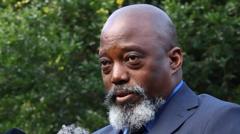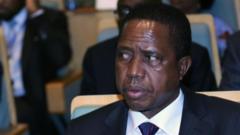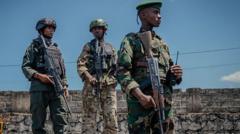The Democratic Republic of Congo takes drastic actions against former president Joseph Kabila and his party, raising political tensions amid ongoing conflict.
**DR Congo Government Bans Former President Kabila's Party Amidst Escalating Tensions**

**DR Congo Government Bans Former President Kabila's Party Amidst Escalating Tensions**
Congo accuses Joseph Kabila's party of ties to rebels as he returns from exile.
In a significant political upheaval, the Democratic Republic of Congo's government has officially banned the political party of former President Joseph Kabila, citing alleged connections to the M23 rebel group that has occupied considerable territory in the eastern part of the country. The move follows Kabila's return to DR Congo after a two-year period in South Africa; he reportedly arrived in Goma, a town recently taken over by the M23, which is believed to be supported by Rwanda.
The Interior Ministry's proclamation stated that the People’s Party for Reconstruction and Democracy (PPRD) was banned due to its "ambiguous attitude" toward the M23's actions in Congolese territory. The statement also expressed concerns about Kabila's choice to return to Goma, labeling it a position of protection from an "enemy."
Kabila, who previously led Congo for 18 years after succeeding his assassinated father, Laurent Kabila, has denied any association with the M23 rebels. The government has escalated its actions against him by accusing him of high treason, leading to the seizure of his assets. As of now, Kabila has not publicly confirmed his presence in DR Congo but has indicated plans to return, contradicting statements from senior PPRD officials who claim he is not in Goma.
Kabila's spokesperson, Barbara Nzimbi, announced on social media that the former leader will soon address the nation. Meanwhile, M23 representatives remained noncommittal about Kabila's status in Goma, stating that there should not be a problem with his presence there.
Kabila's legacy includes two electoral victories, but his presidency came under scrutiny for alleged electoral manipulation and his refusal to step down after his official term ended in 2016, resulting in civil unrest. His government eventually ended in January 2019 when he peacefully handed over power to Félix Tshisekedi. However, tensions among political factions have persisted, contributing to the country’s ongoing crisis.
Kabila has stated that his return is motivated by a desire to help alleviate the escalating institutional and security crisis in DR Congo. Political analysts have noted the strategic implications of Kabila's ties to former allies associated with the M23 and the historical parallels to his father's ascent to power in the late 1990s. This situation continues to unfold as observers monitor the potential impact on the already volatile Congolese political landscape.
The Interior Ministry's proclamation stated that the People’s Party for Reconstruction and Democracy (PPRD) was banned due to its "ambiguous attitude" toward the M23's actions in Congolese territory. The statement also expressed concerns about Kabila's choice to return to Goma, labeling it a position of protection from an "enemy."
Kabila, who previously led Congo for 18 years after succeeding his assassinated father, Laurent Kabila, has denied any association with the M23 rebels. The government has escalated its actions against him by accusing him of high treason, leading to the seizure of his assets. As of now, Kabila has not publicly confirmed his presence in DR Congo but has indicated plans to return, contradicting statements from senior PPRD officials who claim he is not in Goma.
Kabila's spokesperson, Barbara Nzimbi, announced on social media that the former leader will soon address the nation. Meanwhile, M23 representatives remained noncommittal about Kabila's status in Goma, stating that there should not be a problem with his presence there.
Kabila's legacy includes two electoral victories, but his presidency came under scrutiny for alleged electoral manipulation and his refusal to step down after his official term ended in 2016, resulting in civil unrest. His government eventually ended in January 2019 when he peacefully handed over power to Félix Tshisekedi. However, tensions among political factions have persisted, contributing to the country’s ongoing crisis.
Kabila has stated that his return is motivated by a desire to help alleviate the escalating institutional and security crisis in DR Congo. Political analysts have noted the strategic implications of Kabila's ties to former allies associated with the M23 and the historical parallels to his father's ascent to power in the late 1990s. This situation continues to unfold as observers monitor the potential impact on the already volatile Congolese political landscape.





















